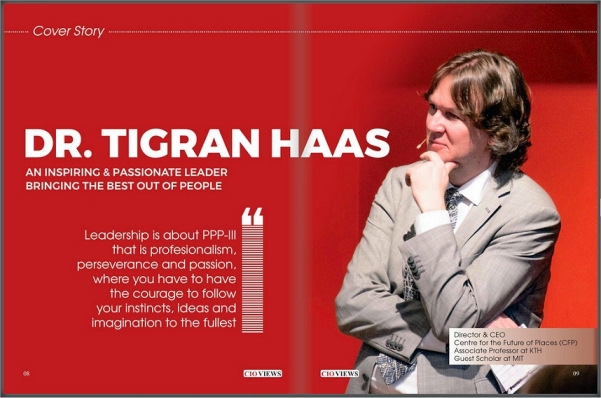Lessons for Management and Leadership
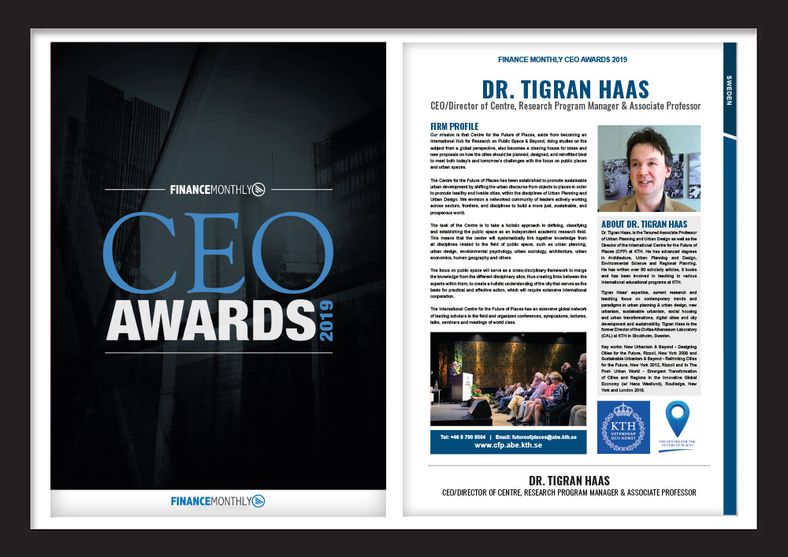
Lessons for Management and Leadership
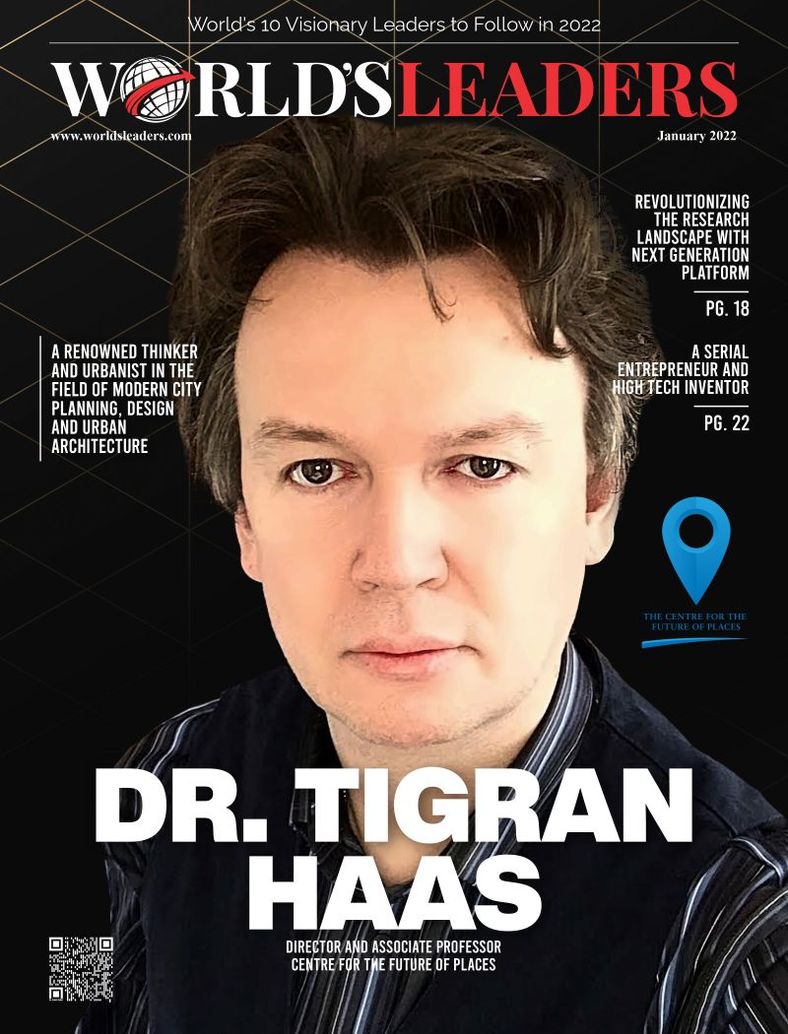
Dr. Tigran Haas: A Renowned Name in Urban Planning and Urban Design, Environmental Science, and Regional Planning
KTH Royal Institute of Technology
A leader is someone who has the ability to understand and connect with people and places. They have the skills to communicate effectively with individuals from diverse backgrounds and cultures and can empathize with their perspectives and experiences. A leader who understands people can build relationships and trust with their team members, inspire them to achieve common goals and create a positive work environment that fosters creativity, innovation, and growth. Dr. Tigran Haas is a leader who believes in the power of people and their potential to achieve great things. His leadership style is characterized by empathy, collaboration, and a commitment to excellence.
Dr. Haas possesses advanced degrees in architecture, urban planning and design, environmental science, and regional planning, providing a unique perspective on comprehending the complexities and issues at the macro, meso, and micro levels of cities. In addition to being a tenured Associate Professor of Urban Planning and Urban Design, they have also held various leadership positions, including Lab Director of Halcyon Athenaeum Laboratory (HAL), Director of Civitas Athenaeum Laboratory (CAL), Director of the Centre for the Future of Places (CFP), Director of the Graduate Program in Urbanism (MUSE), and Co-Director and Founder of the first Scandinavian Graduate Program in Urban Planning and Design (UPD) at the School of Architecture and the Built Environment at KTH. Dr. Haas has further expanded their expertise through Post-Doc Fellowships at MIT, Boston, UC Berkeley, and University of Michigan, Ann Arbor, and currently holds the position of guest research scholar at the esteemed LCAU – The MIT Norman B. Leventhal Centre for Advanced Urbanism in Boston. Their experience also includes eight years of teaching project and strategic management, as well as project leadership at KTH (Stockholm) and ZSEM (Zagreb).
Insights on Leadership
Leadership is a challenging journey of self-transformation, undertaken by an individual who has been entrusted with the responsibility of guiding a team towards achieving a specific business objective. As someone who has taught project and strategic management and project leadership for over 8 years and has also spent 5 years running a research lab and serving as the director of three educational programs, Dr. Haas has gained a deep understanding of the intricacies of leadership.
While getting things done by the team is undoubtedly important, it is just one aspect of a leader’s role. It is equally crucial to assemble a team with the right mix of competence, equality, and professionalism, and to have the finesse to understand where each team member can contribute the most. Dr. Haas understands that expanding and building new networks, both physical and virtual, is essential for building strong relationships with team members and employees. Developing mutual trust, gaining honest feedback, achieving friendships, and fostering mutual respect are all critical components of building long-lasting relationships.
To be an effective leader, Dr. Haas believes it is important to learn from past mistakes, possess strong communication skills, and build sustainable relationships on all levels. Leaders must listen, understand, and take action, and have the optimism and risk-taking ability required to drive their teams forward. They must also possess the ability to read people and adapt them to necessary tasks within the organization, anticipate problems, think outside the box, and eliminate threats and negative personalities. Overall, Dr. Haas’s leadership philosophy emphasizes the importance of building strong inter-personal relationships, fostering a positive organizational culture, creating a trustworthy and mutually understanding community, and driving the team towards achieving its goals.
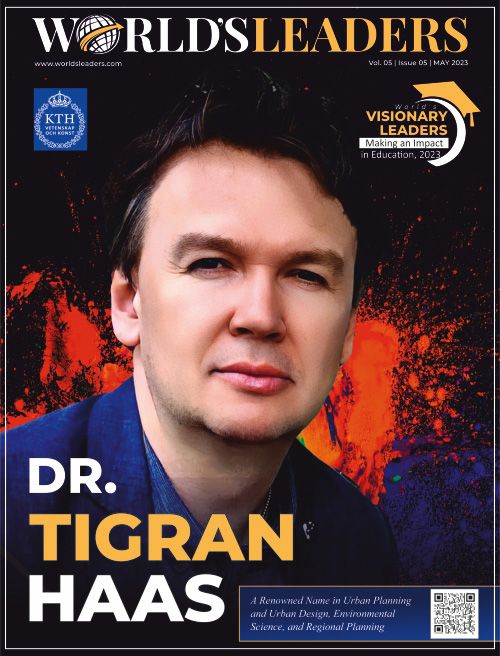
Sharing Views on Academic Freedom
Academic freedom is the principle that provides scholars and researchers the right to conduct their work without interference or restriction. It encompasses the freedom to teach, to learn, to publish and share their research findings and opinions, and to participate in academic debate and discourse. Academic freedom is a fundamental aspect of a democratic and open academic society, as it allows scholars and researchers to pursue the truth, advance knowledge, and freely express their ideas and opinions without fear of retaliation or censorship. Academic freedom is not absolute, however, and may be limited in some cases by laws related to national security, privacy, and other legitimate concerns. In these cases, it is important to balance the interests of academic freedom with the interests of a broader society. In an academic setting, academic freedom has to be protected by institutional policies, such as faculty handbooks, collective bargaining agreements, and university charters. These policies provide a framework for academic freedom and ensure that faculty members are able to pursue their work in a supportive and safe environment.
Tenure track is a system for academic employment that provides a path to attaining tenure, or a guarantee of long-term job security and other benefits, for university professors. The advantages of a stable, secure, and sustainable tenure track system must include:
- Job security: Tenured professors have a greater degree of job security and can continue in their positions as long as they meet performance expectations.
- Academic freedom: Tenured professors are protected from being fired or otherwise punished for speaking out on controversial issues or conducting research that may be seen as unpopular.
- Opportunities for professional growth: The tenure track process provides opportunities for professors to gain recognition for their research and teaching, which can lead to promotion and increased opportunities for professional growth.
- Increased salary and benefits: Tenured professors generally receive higher salaries and more generous benefits than non-tenured faculty.
- Stable funding: Tenured professors are often more likely to receive stable funding for their research projects, which can lead to greater opportunities for discovery and innovation.
World Class High-Quality Research Environments
A university that is considered world-class is an institution of higher education that has achieved global recognition for its exceptional academic standards, cutting-edge research, and highly qualified faculty. These universities typically rank among the top 10, 20, or 50 in major and recognized international university rankings, such as US News, Times Higher Education, and QS, and have a distinguished history of producing ground-breaking research and Nobel Prize winners. They attract a diverse and talented pool of students and faculty from all over the world. Additionally, world-class universities are known for their inclusive learning environments, strong connections to industry and government, and commitment to addressing the countries and the world’s most pressing issues.
A high-quality academic environment is characterized by several essential factors, including an outstanding faculty composed of highly qualified experts in their fields, a diverse student body that fosters an inclusive learning environment, cutting-edge research that produces new knowledge and innovative solutions, a comprehensive and challenging curriculum that prepares students for their future careers and academic pursuits, access to modern facilities and resources, a culture that promotes collaboration, just treatment, inclusivity, and interdisciplinary work, a focus on developing critical thinking and problem-solving skills, and a global outlook that provides opportunities for students to study abroad, collaborate with international partners, and gain a broader perspective on the world.
Education Methods for Future Perspectives
Dr. Haas believes that effective teaching involves using a variety of methods, such as active learning, a student-cantered approach, blended learning, project-based learning, inquiry-based learning, problem-based learning, flipping the classroom, and collaborative learning as well as new and combined approaches. However, the best teaching method will depend on the subject, students, and learning objectives, and effective teaching often involves adjusting methods based on student feedback and assessment data. Lastly, high quality and inspiring instructional paradigm in form of deep and wide lectures and instructions is paramount.
Dr. Haas emphasizes the importance of setting high standards for oneself as a teacher and empowering students to develop critical thinking and intellectual curiosity to navigate the complexity of the real world. He believes that education and teaching must respond to the converging crises in the world and that teachers have a duty to their profession, students, and themselves to cultivate critical thinking and creativity to think beyond what “everyone knows.”
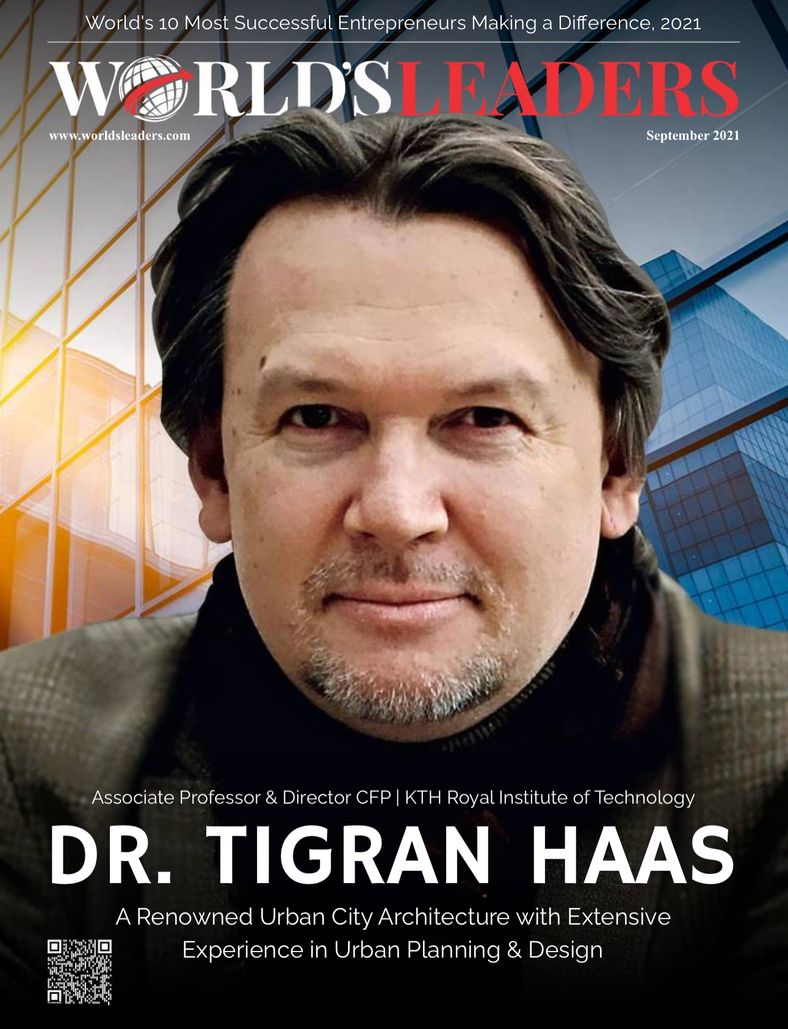
Traits Essential for quality Leadership
Following the 5Ps, namely passion, perseverance, professionalism, persuasion, and playfulness, which serve as a guiding principle in Dr. Haas’s professional life, there are several other factors that he believes are crucial for success. These include taking risks, demonstrating courage and persistence, and having confidence in one’s ideas and abilities. Many successful leaders have emphasized the importance of having the courage to take action when others do not, and Dr. Haas wholeheartedly agrees. Additionally, it is essential to never give up, even in the face of adversity.
Another critical factor is the individuals and teams that surround you. Dr. Haas stresses the importance of selecting talented, hardworking, productive, smart, and honest individuals who are committed to the success of the team above their personal gains. This approach fosters a collaborative, performance-driven culture that unleashes enormous energy and ideas. While there may be other elements to consider, Dr. Haas firmly believes that these factors are key to achieving success in both personal and professional endeavours.
Dr. Haas has identified, through experience, literature, practice, and mentorship from his sage peers and management role models, 15 key principles that he believes are crucial for present and future leaders to possess. These include:
- Facilitating effective communication that is transparent, consistent, and flows freely.
- Managing expectations with clients and stakeholders by controlling the process and language of projects and programs.
- Listening first, acting as soon as possible with the best possible information at the given time, and using interpersonal skills to the fullest.
- Filtering irrelevant or trivial information, as well as bad advice and bad people.
- Setting clear action items, goals, objectives, Critical Success Factors, and Key Performance Indicators.
- Remembering the religion of project management: time, cost, and quality, and finding a sustainable balance between them.
- Communicating transparently and giving much more than is needed and expected.
- Empowering others to fix issues themselves, identifying each team member’s strengths and weaknesses, and building long-term relationships with the team.
- Taking risks and gaining rewards, with the greater the risk, the higher the reward.
- Removing obstacles and distractions, such as psychopathic individuals, sorting out problems early, and having emergency and contingency plans in place.
- Learning to be humble, accepting critical and sound criticism, and being self-aware.
- Being a great artist by pulling and stealing ideas from everyone involved, giving credit where it’s due, and paying close attention to every detail.
- Promoting a great community culture, brand, name, honor, and pride with established shared beliefs.
- Forming positive relationships with partners and stakeholders, reaching out to networks when needed.
- Believing in oneself, sharing knowledge, experience, ideas, trials, and tribulations with others.
Dr. Haas believes that these principles will help leaders to achieve success and make a positive impact in their personal and professional lives.
Vision for the New Lab under the Royal Institute of Technology
KTH – The Royal Institute of Technology in Stockholm was founded in 1827 and has grown into one of Europe’s leading technical universities, known as “The MIT of the North.” With a focus on sustainable solutions to global challenges such as climate change, energy supply, urbanization, and quality of life, KTH brings together students, researchers, and faculty from all over the world, working in collaboration with business and society. KTH offers education and research in all branches of technology, as well as science, architecture, industrial economics, social planning, history, and philosophy. The innovative environment fosters versatile solutions, and KTH’s education prepares a new generation of engineers, architects, and teachers to meet the challenges of the future.
The HAL Lab at KTH, which integrates the best from CAL and CFP (former interdisciplinary Lab and former Centre of Excellence), is a research centre focused on investigating the challenges faced by regions, metropolitan cities, towns, and neighbourhoods in achieving more sustainable, resilient, adaptable, transformable, liveable, just, and inclusive urbanism. The research, which includes a variety of mediums such as publications, exhibitions, events, online meetings, conferences, seminars, conversations, and dialogues, focuses on the urgent topic of urbanism and the role of the public realm as an essential urban framework. The new HAL Lab continues the work of the Centre for the Future of Places (CFP), which was established to promote sustainable urban development by shifting the urban discourse from objects to places, and envisioned a networked community of leaders working to build a more just, sustainable, and prosperous world.
The HAL Lab’s principal professional concern is the evolving role of urban planning and design within broader interdisciplinary fields and their impacts upon human environments and social life. One of the new features of the HAL Lab is a focus on developing new theories and methodologies for understanding the complexities of ever-changing transformations in the city, particularly in the context of the “NEW REAL” after COVID-19.
As Dr. Haas considers, university education in the future is likely to be more diverse, technology-driven, and focused on preparing students for the complex converging crises, ever changing real-world challenges, and difficult choices they will face in their careers.
Written by Steve Sanchez.
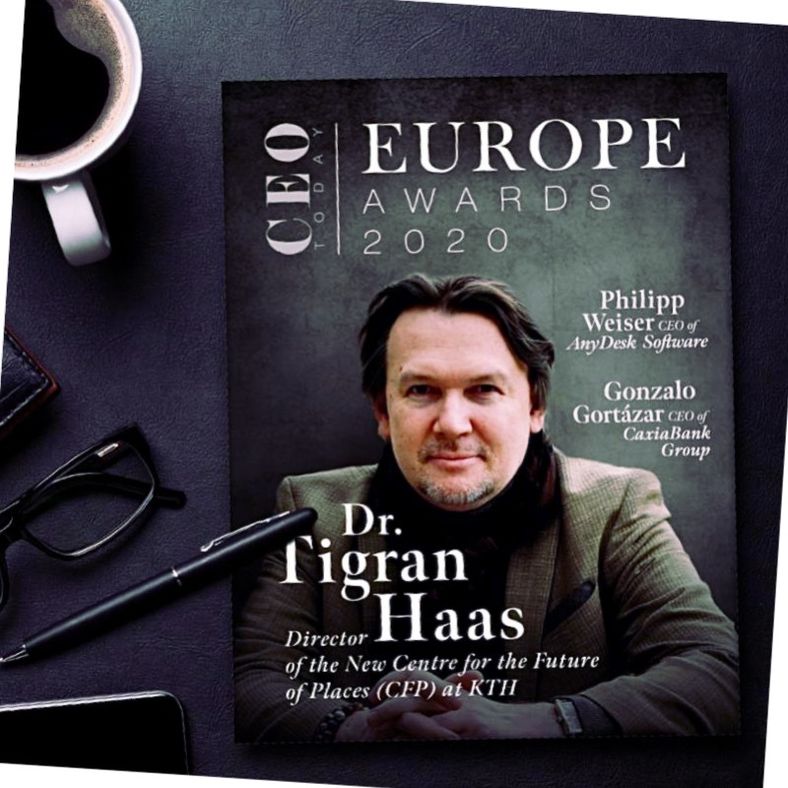

In an interview with CIO LOOK, Dr. Tigran Haas—Director/CEO of the International Centre for the Future of Places (CFP), emphasizes on his vision and achievements en route to success. He holds an expertise in current research and teaching focus on contemporary trends and paradigms in urban planning & design, new urbanism, sustainable urbanism, social housing and urban transformations, and city development and design.
CIO LOOK admire such leaders and feels pride in featuring Dr. Haas in its special edition edition, “Revolutionary CEOs, 2019“.
Below are the highlights of the interview:
Kindly take us through your journey on becoming a leader.
Leadership is definitely a complex journey of self transformation, a journey traveled by an individual who has been handed over the responsibility of guiding people towards achieving a certain business objective. Teaching Project and Strategic Management and Project Leadership for over 8 years has help me understand some of these things much better and the period of 5 years running a research Lab plus being director of three educational programs has also helped immensely. Getting things done from the team is just one part of the job of a leader and the team has to be assembled in the best possible way where the issues of competence, equality and professionalism are crucial but also the finesse to know where each person can contribute the most. At the outset of my leadership role, I started to expand and build new networks. Connection on all physical and virtual platforms was a must and continues to grow; where the inner great relationship with the team and employees is crucial and is sine qua non for the sustainable longevity of the enterprise. Winning their trust, gaining honest feedback, achieving friendships and developing mutual respect is crucial.
How do you describe your company’s purpose and entice your target audience to gain benefits from your organization’s offerings?
As an international research Centre, focusing on the relation between urban form and human behavior with a focus on public spaces, the audience is very much academic but also practitioners, policy makers and the civil society or general public. The Centre works on a few levels where the research findings are geared for a pathfinding way into policy and also passing through practice. The most important things are the highest quality outputs in research, publications, media events and societal relevance as well as links to higher, graduate and post graduate education. The pillars that the host institution of KTH has, those of sustainability, equality and internationalization are deeply embedded into the fabric of the everyday ad strategic activities of the Centre. With a strong physical and virtual staff with highest competences in the area, we believe that through the four themes of sustainable urbanism, housing and urban spaces, urban form and human behavior and urban transformations projects and research findings of high quality can and are emerging, to which our annual report 2016/2017 and the 2018 are testimonies and the 5 awards the Centre has already received from its three year work.
What are the crucial traits which every CEO must possess?
Ability to learn from the past and from mistakes; strong communication skills and building sustainable relationships on all levels; listening, understanding and doing; optimism and risk taking to a specific degree; reading people and adapting them to necessary task in the organization; anticipating problems and thinking outside the box; eliminating threats and psychopathic personalities.
As per your opinion, what roadblocks or challenges are faced by CEOs whilst emerging as a leader? And what is your advice to overcome them?
One of the hurdles is surely the environment one is at, the micro, meso and macro. Micro being the immediate one with all the challenges of competences, staff, tasks, immediate decisions, administration and leadership as well as conflicts; the meso being the plane of projects and partnerships and cases on the ground and the cities where the work is being done but also the products, the media, networks etc. and finally the macro with all the challenges and competition and major issues on the regional national and global level that influence the work and strategy of the place where one works. Roadblocks will be many from personal choices, communication, decisions and project and program work that brings many knowables but also many unknowables. The key thing is a tight organization with good leadership and delegation of responsibilities where the chemistry functions and all are onboard towards a common goal and where mutual benefit must prevail, nit individual gain and vanity.
What will be your future endeavors and/or where do you see yourself in the near future?
After the five-year sequel of the Centre, we will see what the future has installed for us, that is where the next focus will lie in the coming five years, either continuing in then path we have set or turning the ship into another, slightly less (un)charted destination. One thing is sure, that in the next two years the focus will be on the critical issue of rising smart and new experimental cities and issue of autonomous mobility but still having the first 3-year theme of cities for all and who owns the city in the backdrop. The main issue is that cities are getting more complex and the challenges are rising on a daily basis with multiple converging crises that seek answers for new theories, tools and approaches. The Centre will try to answer these calls as it goes into the next period.

